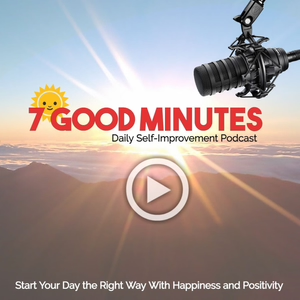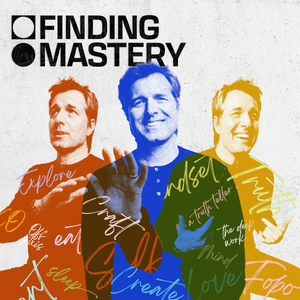
Ep. 146: Dr. Kathryn Gordon — How to Save a Life by Meeting Despair with Love and Connection
09/01/21 • 56 min
My guest this week is Dr. Kathryn Gordon. Katie’s a clinical psychologist and she recently wrote The Suicidal Thoughts Workbook, so our discussion centered around suicide. This is a painful topic that touches so many of us, and it leaves such a hole in our lives when we lose someone to suicide. A friend of mine took his own life a few years ago, and I still think about it nearly every day, and wonder what was going on in his mind and in his heart that led him to that place of desperation. I’ve also had my own battles with wanting to end my life, when I was in the depths of a chronic illness and depression and started to believe it’d be better for everyone if I just went away.
As you’ll hear in our discussion, I really appreciate how Katie approaches the issue of suicide. It’s a scary thing when we know someone is thinking about ending their life, and it’s easy to go into crisis-management mode, and really lose sight of the person in front of us. Katie’s focus is on staying really close to the person, and inviting them to tell her more—really sending the message that there’s nothing defective about us when we’re feeling suicidal, and this is exactly the response that’s missing so often in discussions of suicide.
I think the mental health world by and large has made the mistake of emphasizing safety over humanity when suicide is in the room. I’ve heard this from many of my patients and in response to blog posts I’ve written about suicide—that nobody wants to bring it up because they’re afraid they’re going to be treated as a risk to be managed, and that they’re going to be locked up against their will, instead of being treated as a person in pain who needs more connection in that moment.
Now, of course safety is important, and we want to do everything we can to help ourselves or our loved one or our patient to stay alive. But we might need to remind ourselves not to lose sight of the bigger picture, that someone who’s suicidal doesn’t want to live because they’re in pain. So it’s not just a question of “what can we do to keep you alive?” We have to ask how we can help someone to move through the pain and find the connection that makes life worth living. And that’s exactly what Katie’s book is all about, so I’m really pleased to share this conversation with you.
Get full access to Think Act Be with Seth Gillihan at thinkactbe.substack.com/subscribe
My guest this week is Dr. Kathryn Gordon. Katie’s a clinical psychologist and she recently wrote The Suicidal Thoughts Workbook, so our discussion centered around suicide. This is a painful topic that touches so many of us, and it leaves such a hole in our lives when we lose someone to suicide. A friend of mine took his own life a few years ago, and I still think about it nearly every day, and wonder what was going on in his mind and in his heart that led him to that place of desperation. I’ve also had my own battles with wanting to end my life, when I was in the depths of a chronic illness and depression and started to believe it’d be better for everyone if I just went away.
As you’ll hear in our discussion, I really appreciate how Katie approaches the issue of suicide. It’s a scary thing when we know someone is thinking about ending their life, and it’s easy to go into crisis-management mode, and really lose sight of the person in front of us. Katie’s focus is on staying really close to the person, and inviting them to tell her more—really sending the message that there’s nothing defective about us when we’re feeling suicidal, and this is exactly the response that’s missing so often in discussions of suicide.
I think the mental health world by and large has made the mistake of emphasizing safety over humanity when suicide is in the room. I’ve heard this from many of my patients and in response to blog posts I’ve written about suicide—that nobody wants to bring it up because they’re afraid they’re going to be treated as a risk to be managed, and that they’re going to be locked up against their will, instead of being treated as a person in pain who needs more connection in that moment.
Now, of course safety is important, and we want to do everything we can to help ourselves or our loved one or our patient to stay alive. But we might need to remind ourselves not to lose sight of the bigger picture, that someone who’s suicidal doesn’t want to live because they’re in pain. So it’s not just a question of “what can we do to keep you alive?” We have to ask how we can help someone to move through the pain and find the connection that makes life worth living. And that’s exactly what Katie’s book is all about, so I’m really pleased to share this conversation with you.
Get full access to Think Act Be with Seth Gillihan at thinkactbe.substack.com/subscribe
Previous Episode

Ep. 145: Regina Louise — Finding the Strength and the Will to Live Life on Your Own Terms
My guest this week is Regina Louise, author of a new book called Permission Granted: Kick-Ass Strategies to Bootstrap Your Way to Unconditional Self-Love. I know I’ve often tended to seek permission from other people to do the things I want to do. The first time I had a book contract, for example, I felt like colleagues and past supervisors were looking over my shoulder, and like I had to clear everything I wanted to say with them in my head before I wrote it. But obviously that’s not a great place to write from, and we end up really limiting ourselves when we look to others for permission that isn’t theirs to give. So as you’ll hear Regina describe, we can liberate ourselves from the false stories we carry about what we’re allowed to do and who gets to decide who we are and what we’re capable of. I think you’ll find her message very uplifting and inspiring.
Get full access to Think Act Be with Seth Gillihan at thinkactbe.substack.com/subscribe
Next Episode

Ep. 147: Dr. Carmen McLean — How Does Effective Trauma Treatment Heal the Body and Brain?
My guest this week is Dr. Carmen McLean, who specializes in treatment for posttraumatic stress disorder or PTSD. She recently co-authored a book called Retraining the Brain: Applied Neuroscience in Exposure Therapy for PTSD. It was great to get Carmen’s take on how effective treatment works and how we can support the body and brain’s natural ability to heal following a trauma. I shared some about my own experience recovering from a traumatic assault, and we explored how powerful it can be to face our trauma-related fears and memories systematically, as we do in cognitive behavioral therapy. Toward the end of our discussion we also talked about a free app that can help with recovery from trauma, which I provide a link to in the show notes.
Get full access to Think Act Be with Seth Gillihan at thinkactbe.substack.com/subscribe
If you like this episode you’ll love
Episode Comments
Generate a badge
Get a badge for your website that links back to this episode
<a href="https://goodpods.com/podcasts/think-act-be-podcast-8932/ep-146-dr-kathryn-gordon-how-to-save-a-life-by-meeting-despair-with-lo-16330998"> <img src="https://storage.googleapis.com/goodpods-images-bucket/badges/generic-badge-1.svg" alt="listen to ep. 146: dr. kathryn gordon — how to save a life by meeting despair with love and connection on goodpods" style="width: 225px" /> </a>
Copy




